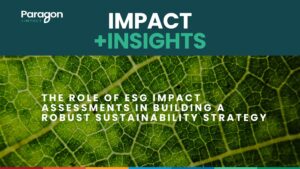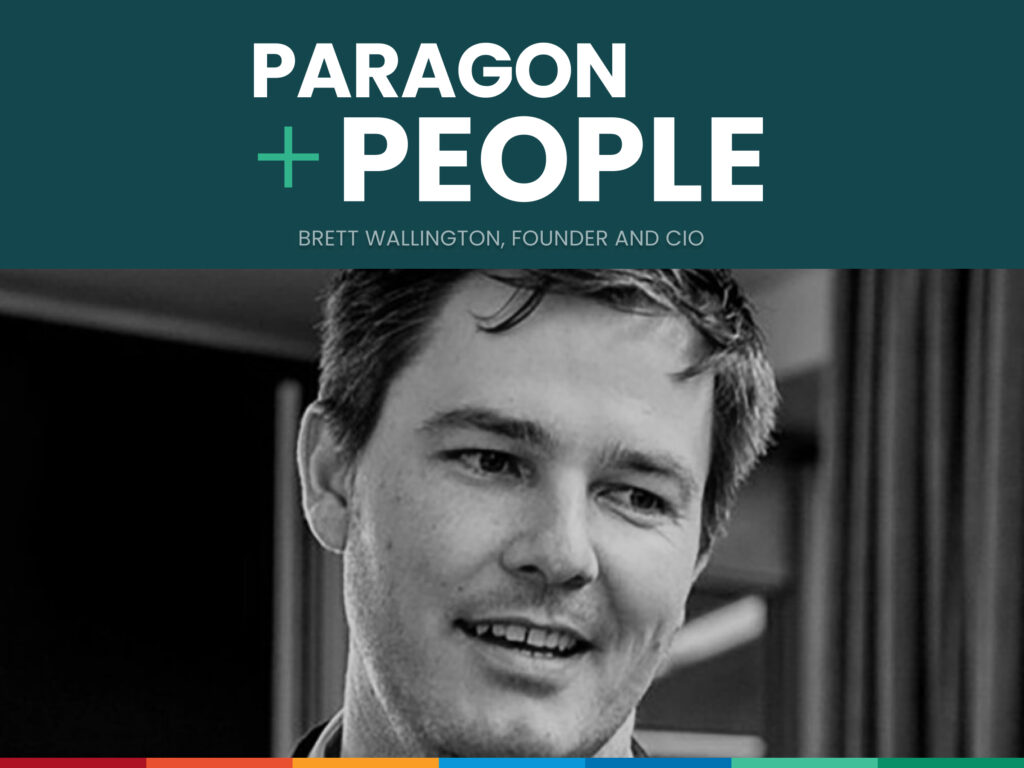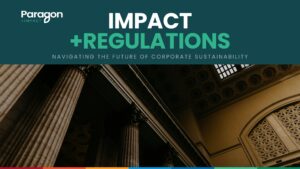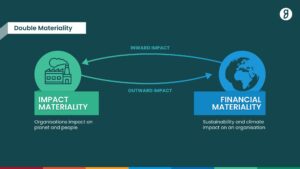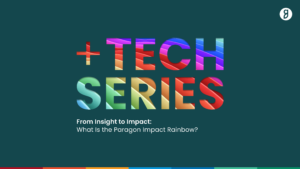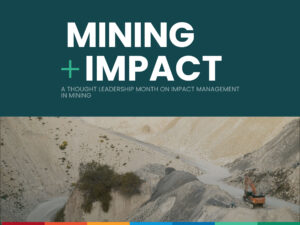With a career in sustainability that spans over two decades, Brett Wallington is ready to scale Paragon +Impact to a global stage. Recently, we sat down with our Founder and Chief Impact Officer for our Paragon +People series where Brett answered all our burning questions — from his journey into sustainability from academia, becoming the Group Head of Sustainability for Standard Bank to how he started Paragon +Impact and where he sees the field evolving. Read on to discover Brett’s inspirational journey.
- Tell us a bit about your background in sustainability and impact.
My journey in sustainability began with a childhood fascination for the environment, spending time in The Bushel and going on safaris. After completing my schooling, I pursued a degree in Ecology, Environment, and Conservation. Following that, I delved into a postgraduate degree of Zoology, where I studied large mammals.
What really piqued my interest in the field of sustainability was working as a Game Ranger at Londolozi Game Reserve. It was here that I participated in sustainability initiatives, such as incorporating solar power and LED lighting across the lodges. During my time at Londolozi, I got involved in various social initiatives such as the Good Work Foundation, an education program for local community kids.
After relocating to Johannesburg, I founded a sustainability consulting business, helping homeowners adopt green, eco-friendly practices. This venture led to an internship with an integrated reporting company, where I became a Certified Sustainability Assurance Practitioner (CSAP).
Subsequently, I joined Wilderness Safaris, a listed safari company, as their Group Sustainability Manager. I honed my skills in sustainability reporting and played a key role in prioritizing environmental projects for their camps.
Recognised for my contributions, I transitioned to Standard Bank, Africa’s largest listed bank. As the Group Head of Sustainability, I spearheaded a new sustainability strategy emphasising the social, economic, and environmental impact. Over my nearly four years at the bank, I broadened my understanding of sustainable finance, contributing to award-winning integrated reports.
Seeking further innovation, I co-founded Paragon +Impact with my friend Philip Faure.
- What had the greatest influence on your journey?
My greatest influence came from my time at Wilderness Safaris, followed by Standard Bank. Unlike many corporate-based sustainability professionals, I had the opportunity to delve into the practical aspects of sustainability and impact on the ground.
Wilderness Safaris provided a transformative experience as I actively participated in turning camps into sustainable operations. Through first hand involvement, I grasped the complexities of on-the-ground sustainability and learned to prioritise impactful initiatives. For instance, I witnessed how the shift from relying on diesel to adopting solar power in the Okavango Delta exemplified our tangible environmental impact. This one shift not only minimised the risk of spillage but significantly reduced our carbon emissions.
I engaged with local communities, understanding the socio-economic dynamics tied to our operations. These interactions with community leaders fostered a sense of responsibility and protection for the environment.
This helped me in my next role for Standard Bank, where I gained a unique perspective as I could vividly illustrate real-world impact in my sustainability reporting. Whether it was citing camp locations in Namibia to preventing environmental harm or collaborating with local leaders for socio-economic integration, I had a holistic view of sustainability. This firsthand knowledge became invaluable, allowing me to connect the dots between corporate strategies and their on-the-ground implications.
At Standard Bank, where I previously worked, I observed that many sustainability efforts were focused on high-level corporate strategies, reports, and policies, often lacking real-world implementation experience.
Wilderness Safaris provided me with a holistic understanding of sustainability, bridging the gap between corporate rhetoric and tangible on-the-ground impact.
This experience has shaped my approach to sustainability at Paragon+Impact, emphasizing the need to ground high-level discussions in practical, impactful actions.
- What’s the story behind Paragon +Impact?
The genesis of Paragon+Impact is closely tied to my experiences at Standard Bank, particularly in the field of sustainability reporting. I was frustrated with the lack of transparency in the reports I was crafting. It seemed more like marketing speak rather than an authentic representation of the bank’s sustainability efforts. The flexibility in reporting for sustainability was a weakness; there was no standardized approach.
I also observed how ESG rating agencies operated. Many rating agencies relied on scraped data and a limited set of questions, resulting in a one-way approach. They offer ratings without providing businesses with actionable insights or strategic value. They provided ratings without transparent methodologies, making it challenging for businesses to understand their impact and improve. Their focus on financial risks, rather than a business’s impact on the environment, felt misplaced.
I realized that there was a need for a shift from ESG (Environmental, Social, and Governance) to SDG (Sustainable Development Goals) – understanding a business’s contribution to sustainable development. This inspired me to build a tool around industry standards, with an emphasis on SDGs. We needed a standardized way to measure and track sustainability, providing businesses with a clear roadmap for improvement.
We recognized the need for a more collaborative and informative process, where businesses not only receive ratings but understood the areas of impact and improvement. This allows for a more strategic and impactful partnership based on real, tangible outcomes.
Eventually, my co-founder Philip Faure and I transformed this concept into a technological solution with global potential. This is how we built Paragon +Impact’s revolutionary +Grading Tool.
Our goal was to offer businesses more than just an ESG rating. Rather, provide them with strategic insights, impact analysis and advisory services for meaningful, iterative improvements.
- What do you like the most about sustainability and impact?
Working in sustainability allows me to align my professional journey with a meaningful mission — not just benefiting my team but also delivering success for our clients and partners.
I love the profound sense of purpose it brings to my life. Contributing toward solutions for a more sustainable future is a driving force for me. I believe in leading with purpose, and I’m confident that success will naturally follow.
Ultimately, I see it as an opportunity to leave the world in a better place than I found it.
- What is your leadership philosophy?
I define my philosophy as “Freedom within a Framework” emphasizing the autonomy to operate within set boundaries for the collective success of our team.
Essentially, we’re collectively dedicated to a common goal – fostering sustainable development through impact management. The framework sets the parameters of our mission, emphasizing the importance of achieving specific outcomes.
I often draw parallels to a soccer team. Each team member is also an integral part of the collective effort.
This philosophy revolves around providing freedom to individuals within the team, highlighting the freedom players have on the pitch to execute their roles, while staying within certain boundaries and constraints.
This approach encourages collaboration and a flat hierarchy, ensuring everyone’s importance and contribution to the team’s success. There’s no vertical hierarchy. Instead, we’re all supporting each other to achieve our common goal – winning the game.
- What do you love most about your team at Paragon +Impact?
It’s the people and culture we have here at Paragon that resonate with me the most.
Our team is not just passionate about the work we do; they embody it. Each member brings a unique perspective. They are not just colleagues — they are partners united by a common goal and a shared purpose for making a positive impact.
They say the first 10 people that join a startup define its success trajectory and I strongly agree. Having an incredible team is pivotal for a startup’s culture. And I believe the group we’ve assembled here at Paragon +Impact is truly exceptional.
- What challenges do you think this field is facing? Where do you see sustainability and impact evolving?
Over the past two years, sustainability and impact assessment have undergone significant evolution, particularly in terms of consolidation within the field. When Paragon began, there were numerous standards, frameworks, and indicators, making tool development complex. Initially identifying a hundred, we faced the challenge of navigating this vast landscape.
I think the trajectory of the field is moving toward a more structured system, responding to the increasing regulation of sustainability. Notably, Europe has taken a lead with the CSRD, indicating a shift towards a regulated space. This consolidation trend aims to streamline the standards, providing a more unified approach.
Looking ahead, the industry is transitioning into a more professional service. The complexity of sustainability demands expertise, and advising effectively requires a deep understanding of the space. Non-compliance repercussions, including legal consequences and the rise of greenwashing concerns, underscore the need for professionalism.
One of the significant challenges is the ongoing confusion amidst consolidation. In Europe, the CSRD and SFDR cater to company and financial services perspectives, respectively. The UK also introduced the SDR, which is similar yet distinct.
This lack of harmonization raises questions about the necessity for separate regulations. Additionally, the global nature of the economy adds complexity, as companies trading between Europe, the UK, and the US must navigate multiple sustainability regulations. Harmonizing these regulations globally would simplify compliance for businesses operating across borders. This is what I identify as the need of the moment.
- What does “success” look like to you and Paragon +Impact?
Success, to me, is tied to the profound impact we make through Paragon +Impact.
In my perspective, success goes beyond mere profits — it’s about establishing the Paragon Grading System as the ‘Gold Standard’ for how organisations measure and report on their impact. Our success lies in transforming the complex landscape of sustainability reporting and impact measurement into a simplified and standardized system, creating a lasting mark on the industry.
As they say, the first 10 individuals in a startup play a vital role in shaping the culture, and our current team is nothing short of amazing. Each member is passionate about our mission, creating a unique and vibrant culture here. We all share a common goal, making the work environment both inspiring and fulfilling.
- What is your vision for the future?
My vision revolves around our significant role in establishing a standardized methodology for measuring impact and holding companies accountable for their true impact.
Whether you’re an investor, consultant, or a bank, my goal is that we all operate from the same rhythm sheet in understanding and measuring impact. Whether it’s an impact investment showcasing positive outcomes or a company with negative impacts that need mitigation, our +Grading Tool should guide decisions and encourage a shift toward more sustainable practices.
I see our tool not only as a means to measure impact but also as a catalyst for better decision-making. Businesses, influenced by our approach, should strive to become more sustainable and enduring over the next 50 years. I believe that through our disruptive approach, we’re changing the game and creating a new standard for how things should be done.
- 5 years
As for the future, I envision Paragon +Impact taking center stage as a leading force in impact management. I want our team to grow steadily and form strategic partnerships to accelerate impact on a global scale. My goal is to make the Paragon +Grading Tool as a ‘Gold Standard’ for how organisations measure their impact.
Given our aspirations, I foresee a strategic acquisition by a larger entity with the network, client base, and capital to propel our methodology and tools globally.
Whether through a merger or acquisition, I anticipate joining forces with a more extensive team. Ensuring our collective efforts bring about impact on a scale we couldn’t achieve independently. My role will be instrumental in making this transition a reality.
I envision a future where responsible investing and capital allocation is the norm. And to create a world where sustainability is not just another compliance headache for companies — but a strategic business benefit.
